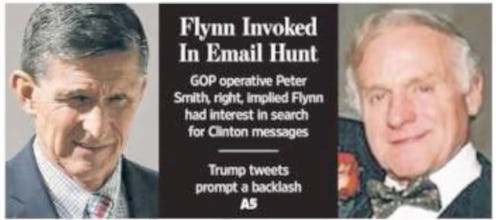
On Thursday, the Chicago Tribune reported new details on the death of Peter W. Smith, a GOP operative who tried getting Hillary Clinton's emails from what he believed to be Russian hackers. Less than two weeks after talking with a reporter from the Wall Street Journal about his attempt to obtain the emails, Smith reportedly committed suicide. Prior to the Tribune's report, the 81-year-old was believed to have died of natural causes on May 14.
That all changed when the Tribune took a look at a Minnesota state death record claiming that Smith had actually taken his own life in a hotel room. According to the record, police had discovered what seemed to be a suicide letter in the room. In it, Smith confirmed that there was "no foul play whatsoever" and that he decided to take his life because of a "recent bad turn in health since January, 2017." He also mentioned that his $5 million life insurance would be expiring soon. As noted by New York Magazine, however, the FBI has reason to possibly take a closer look at the circumstances surrounding Smith's death.
Less than two weeks prior to his death, Smith sat down with Shane Harris for an interview that was published in the Wall Street Journal on June 29, 2017. During his interview, Smith told Harris that he began searching for Clinton's missing private server emails — around 33,000 of them — over Labor Day weekend in 2016. According to the Journal, Smith's emails implied to his recruits that he was working with Michael Flynn or, at the very least, that he considered Flynn an ally. However, Smith insisted to the Journal that he was operating completely independently of the Trump campaign. Still, the possibility that Smith and Flynn were working together and potentially communicating with Russian hackers has added to the Russia collusion controversy. Bustle has reached out to Flynn's lawyer, Robert Kellner, for comment.
Of course, Trump has denied colluding with Russia to win the 2016 presidential election, calling the Russia investigation a "witch hunt." Like NYMag mentioned, there are lots of missing pieces in the story, which would make it incredibly difficult to accuse either party of conspiracy.
Furthermore, just a day before his death, Smith published a blog post criticizing intelligence agency findings that supposedly supported Russia collusion allegations. Interestingly enough, this suggests he may not have believed Russia interfered to help Trump win, even though he suspected Russian citizens hacked Clinton's server.